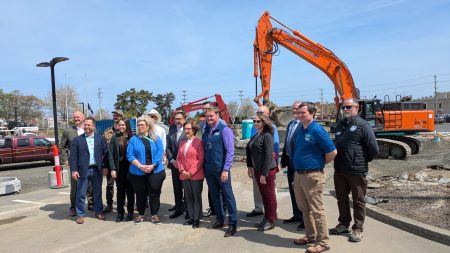
While millions of dollars in federal funding for a major hospital expansion project on Oregon’s North Coast remain uncertain, U.S. Representative Suzanne Bonamici told local leaders she’s not giving up.
On Friday, the Oregon Democrat told Clatsop County and Astoria leaders there is a relatively new bi-partisan call to reverse the Trump administration’s decision earlier this month to terminate the Federal Emergency Management Agency’s Building Resilient Infrastructure and Communities grant program, or BRIC.
The program, intended to help communities prepare for natural disasters, had awarded a $14 million grant to Columbia Memorial Hospital in Astoria in 2023. The hospital is in the middle of an estimated $300 million expansion project at its Astoria campus. The BRIC grant would have helped fund the addition of a vertical evacuation staircase and a safe gathering space on the roof of a new building, among other components meant to keep people safe in case of an earthquake or tsunami.
The hospital planned to start drawing on the money this summer and was caught by surprise when FEMA abruptly announced it would be halting the BRIC grant program as part of an effort to eliminate “waste, fraud and abuse.”
“There’s nothing political about this,” Bonamici told KMUN on Friday during a visit to the Columbia Memorial construction site. “This is saving lives and property. The more we can convince the administration that, number one, these are dollars that have already been committed and projects underway, but also that…this is not a political issue: This is exactly what FEMA should be doing and could be doing.”
Bonamici noted that Columbia Memorial’s expansion has had broad bipartisan support from the local and state level up to the federal level. She called the FEMA cuts “concerning” and said that the attempt to take back money that has already been awarded is possibly illegal and unconstitutional.
If the BRIC funding is not restored, Columbia Memorial CEO Erik Thorsen told KMUN there are other funding strategies the hospital can pursue — and, in some cases, is already exploring.
Columbia Memorial has asked for $6 million from the Oregon Legislature, originally hoping the state would supply the required match to the FEMA grant to bring the total award to $20 million. Thorsen said the hospital still plans to keep that request in motion, but now as a direct award.
The hospital has also applied for other grants, including a $1 million request to the M.J. Murdock Charitable Trust. Thorsen expects to hear a decision on that grant in the coming weeks.
The hospital is also looking at how it can ramp up fundraising efforts and potentially approach different donors.
Lower on the list is to look at ways to cut costs in the building itself.
“I don’t believe we can value-engineer $20 million out of our building,” Thorsen said. But, he added, if the hospital is able to land money from the state as well as additional grant and donor dollars “and then some savings, we can figure this out.”
And while $20 million is $20 million, it is only a part of the overall budget, Thorsen noted. For now, time is on the hospital’s side.
The hospital borrowed the majority of the funds necessary for construction, Thorsen said. “So we can utilize those funds as we’re going through the construction while we’re trying to raise or figure out how we plug basically the $20 million hole.”
In his mind, Columbia Memorial has around two years to figure out how to raise the money that disappeared with the elimination of the BRIC grant.
“Of course, you’re taking on that risk,” Thorsen said. But, he added, “I believe we’re a resilient organization. We will somehow figure this out. I have to remain optimistic that this is still the right thing to do for this community and our organization.”
Mark Kujala, a Clatsop County commissioner and the director of the CMH Foundation, agreed, but laughed and said, “It just puts more pressure on me. We need to raise money.”
The Foundation has been raising money on the philanthropic side for the past two years. Kujala estimates they will land at around $7 million of their original $10 million goal. Now, more is being added to that goal and they will be going back out into a very different donor environment from what existed even a few months ago.
“A lot of community foundations are reacting to the federal funding freezes and they’re changing their priorities,” Kujala said, “and we’ve noticed that from some of the ones that we’ve been in contact with.”
